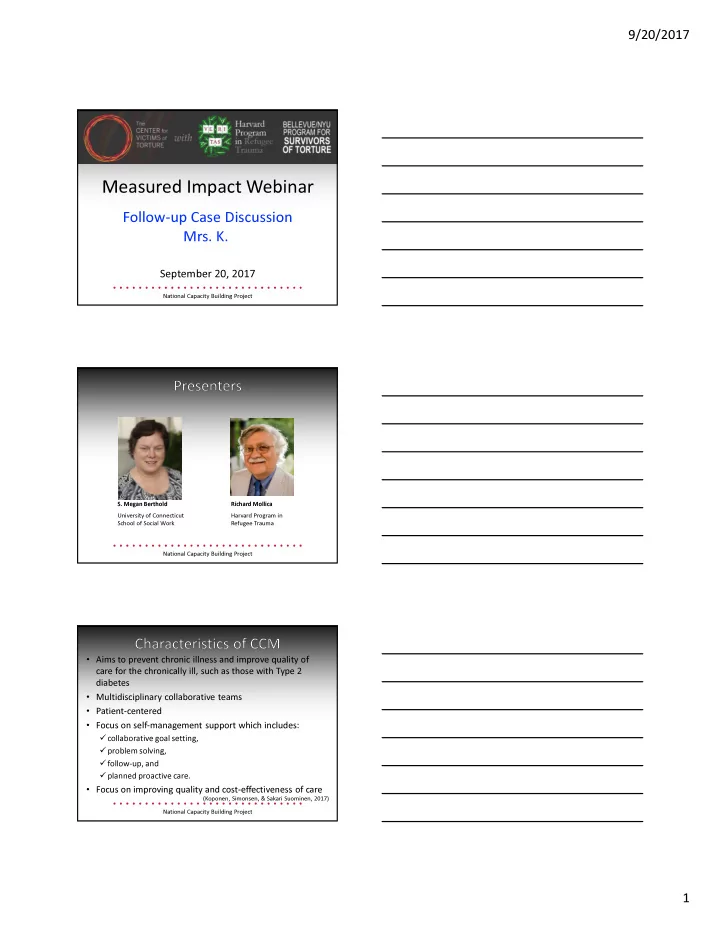

9/20/2017 Measured Impact Webinar Follow-up Case Discussion Mrs. K. September 20, 2017 National Capacity Building Project S. Megan Berthold Richard Mollica University of Connecticut Harvard Program in School of Social Work Refugee Trauma National Capacity Building Project • Aims to prevent chronic illness and improve quality of care for the chronically ill, such as those with Type 2 diabetes • Multidisciplinary collaborative teams • Patient-centered • Focus on self-management support which includes: � collaborative goal setting, � problem solving, � follow-up, and � planned proactive care. • Focus on improving quality and cost-effectiveness of care (Koponen, Simonsen, & Sakari Suominen, 2017) National Capacity Building Project 1
9/20/2017 5 Domains Biomedical Psychological Trauma Health Trauma Survivor Bi Impact Story Experience Spiritual Social Outcomes Cultural Adaptations National Capacity Building Project Mrs. K. is a 40-year old, widowed woman living in a small town in the middle canton of Bosnia and Herzegovina. Referral: Presented to our primary care center in acute distress. Source: Self; first visit of patient; none of the doctors know her Chief Complaint: States that she has severe headaches and that sometimes they are so bad she feels like she is “going to lose her mind!” National Capacity Building Project The patient’s feelings of intense anxiety and upset began three months ago. At that time she began to have violent arguments where she and her only child, a teenage son, would scream at each other. He would initiate the yelling by telling her he could not stand the man with whom she was involved on an intimate basis. She would hit him and he would run out of the house, sometimes not returning home for two to three days. Also, he would miss high school during these episodes. National Capacity Building Project 2
9/20/2017 It was at this time her headaches began. They were initially weekly headaches lasting 2-3 hours. Now they are daily headaches lasting almost all day. They are relieved by lying down in a dark, quiet room. Aspirin does not help. She has no visual symptoms, focal signs, or neurological complaints. Sometimes the top of her head hurts so much that she cannot touch it and needs to put an ice pack on it. National Capacity Building Project Her trauma history reveals that her family had lived for many generations in another town in Bosnia. She was forced out of her home with her husband and two children. A younger daughter was killed by a land mine two years ago. She doesn’t know where her husband is. He may have died, since he disappeared while fighting with the army. Her parents are in Germany; her brother and sister are in the USA. Her husband’s family does not want to have anything to do with her. National Capacity Building Project She has had a very close relationship with her son until recently. She states that he now “hates her.” She does not know why. She is currently a refugee in her new town. Screening for trauma (HTQ) confirms her history, including a brief period of 2-3 months of forced incarceration by the enemy. She refuses to discuss what happened during this time. National Capacity Building Project 3
9/20/2017 1. Material deprivation + 2. War-like conditions + 3. Bodily injury - 4. Forced confinement & coercion + 5. Forced to harm others - 6. Disappearance, death, or injury of loved ones + 7. Witnessing violence to others ++ 8. Brain injury - National Capacity Building Project Discussion and Q & A National Capacity Building Project Thank you for attending this webinar by Dr. Richard Mollica & Dr. S. Megan Berthold on September 20, 2017 The National Capacity Building Project is a project of the Center for Victims of Torture: www.cvt.org More resources are available at: www.HealTorture.org National Capacity Building Project 4
Recommend
More recommend